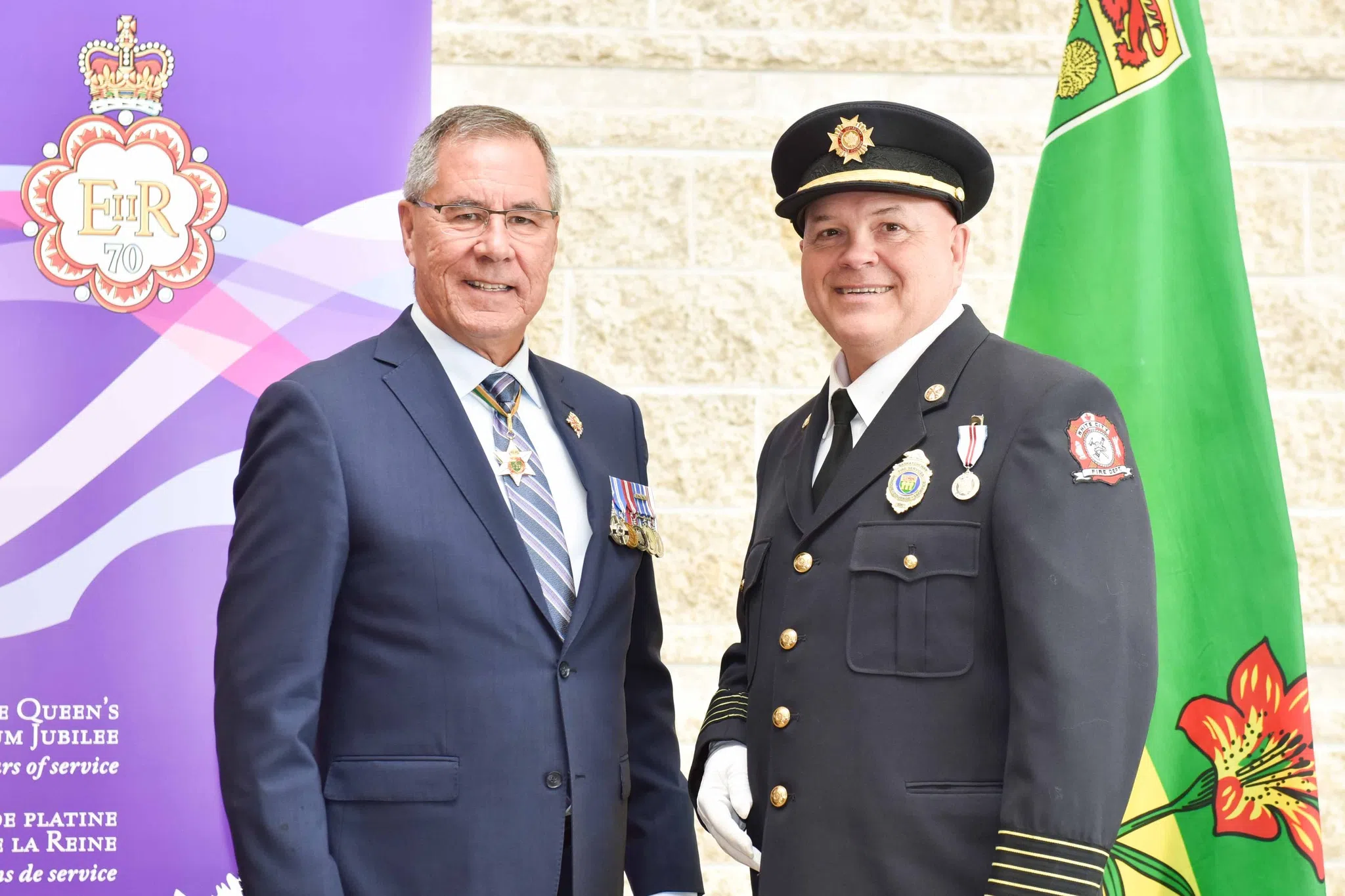After 19 years, White City‘s fire chief Randy “Fire Guy” Schulz is retiring.
But the dedicated firefighter, community member and father still plans to volunteer with the service.
Schulz said he was never one for fancy titles, hence where “Fire Guy” comes from. His dad was a blue-collar worker, truck driver and welder, his nameplate was “Head Fella.”
Schulz was celebrated in the community on Sept. 19 with a retirement tea at White City’s community centre. He received a custom “Fire Guy” Roughrider jersey at the event.
He joined The Evan Bray Show to discuss his nearly two-decade-long career.
Listen to the full interview here:
The following transcript has been edited for length and clarity.
Bray: Walk me through your career with the White City Fire Department.
Schulz: I joined 19 years ago, Jeff Allers and I, and there was 12 of us that joined the same night. Jeff and I are the two that are left out of that 12. And that’s what happens in volunteer service. People move into a community, move out, or just don’t find the fire gig to be what they want, or just don’t have the time. So 19 years on the department, three years as a deputy, and now nine years as chief. I’ll be backing back down to just being a regular member.
You’re going to continue to volunteer?
Schulz: Yes! That’s where my heart is. It’s not as much about the position. As a good leader, you have to decrease so others can increase. And if you don’t have others that can increase in your time there, then you were just a guy taking a walk. We’ve got a great team there with 26 members, that’s including fire and medical responders.

Chief Randy Schulz recieved a Queen Elizabeth II Platinum Jubilee Medal in 2022. It was presented by Lieutenant Governor Russ Mirasty. (Town of White City/Facebook)
It seems as though small town fire departments have been busy, where you’re relying on volunteers to come out and help. Has that been what you’ve seen? Is that consistent through the years, or has 2024 been busier than normal?
Schulz: I think it’s been busier in some areas, and in other areas not as much. When you get out into those rural areas and you have small volunteer departments, they’re strapped for funding, and yet, you’re asking people to go out and put out big grass fires or structure fires, or even car fires. Even with the province coming in with new minimum standards for fire departments, we got to really help those departments be successful or understand what the cost is to be successful.
Do the training opportunities and the funding models match up to those expectations? Are you funded properly?
Schulz: In some places we are. But in other smaller communities I know of their volunteer fire department budget is like $5,000-$7,000 a year. For a new set of turnouts (gear) for a firefighter — helmet, gloves, boots — you’ll kill $5,000 for one.
But there’s some great new technology coming on that can reduce the risk and still get the job done. It’s incumbent on those smaller departments to look for that stuff.
I’ve been fortunate with the town of White City. My last purchase was a 2007 Freightliner ambulance package and brand new that’s $450,000. And I got it out of the States. They started at $28,500 and I talked them down to $20,000. We’ll never wear it out, and it’s a great piece of equipment.
You’ve seen a lot of changes over your career, with the Regina bypass being a big one. And as a firefighter you respond to highway crashes, what’s changed if anything?
Schulz: We were at 32 bad accidents a year. You’d show up on the scene, and you could just see where a good person made a bad decision, and it cost lives. Then you had to wait for the coroner’s office. Then Jerry would show up from the coroner’s office. When your job becomes knowing the coroner on a first-name basis, it’s just not what you set out to be.
Over those 19 years we’ve seen that whole area change and get busier and more people living outside of Regina in that area. Before the Regina bypass, we were at 32 hard accidents a year. Then bypass started their construction, and we stayed at 32 but severity started to drop. And then we got past construction, and it was starting to open up … we dropped to 15. Now we probably total in that area maybe 10, which is going in the right direction. It saved lives.
When you look back on your career, what are some of the things you’re most proud of?
Schulz: We hosted Camp Molly. It’s for a camp for girls that are interested in the fire service. We had 14 girls for four days out at White City Fire and at our training grounds south of White City. We just give them glimpses of the fire service. We know that not all of them are going to go into the fire service, but that really isn’t the goal. It’s to get these young girls to understand that they can be what they want to be.
Read more
- Sask. teenage girl without helmet dies in ATV crash
- B.C woman dies in collision with semi near Dafoe, Sask.













